Cox Technic Proprioception Exercise Program
Proprioception—a big word that simply refers to your sense of body position in your surroundings.
The nerve endings in muscles, tendons and joints send information throughout the body to keep it standing straight, walking straight, sitting straight. With back pain, degeneration and aging, you may feel that you don’t “track right”, you don’t walk straight, you lose your balance more easily. Regaining proprioception is important to prevent falls that lead to fractures. Simple exercises to stimulate those nerve endings and retrain them to sense their positioning better help you regain your confidence in getting around and reduce your risk of falls.
We present three ways of doing proprioception exercises: with support, walking, or with a ball. *
Stand on One Foot
With support (wall, counter, chair), you start a series of proprioceptive exercises that build on your ability to stand securely in one spot. Start with the exercise with which you are most comfortable.
- Hold a counter or chair or wall.
- Lift one leg by bending at the knee and lifting the foot. Stand on the other foot.
- If you feel secure, let go of the counter/chair/wall, and stand on one leg without support. Switch legs.
- If you feel secure without support, close your eyes, and stand on one leg for as long as you can.
- Make a goal of at least 30 seconds in each position.
- NOTE: Give yourself time to adapt. Proprioception doesn’t typically return instantly. It is a work-in-progress.
-
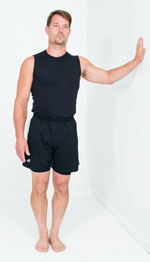
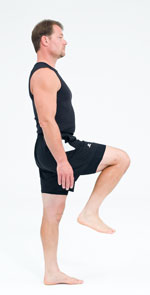
Tandem-Walking
This exercise seems easy, but when your proprioception is off, it’s not!
- Just walk heel to toe slowly and in a straight line.
- Put your arms out to balance, if you need.
- Practice this until you are comfortable and confident.
- NOTE: It will take more concentration than you think!
-
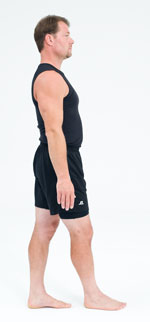
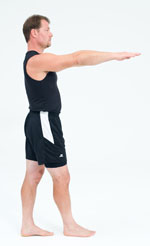
With A Ball - Sit/Bounce
- Sit on the ball.
- Gain your balance.
- Hold a counter or wall for support if you need. Otherwise, rest your hands on your knees.
- Once you are balanced (holding the wall/counter or resting your hands on your knees), just bounce on the ball.
- NOTE: Do this exercise until you are comfortable and confident with it.
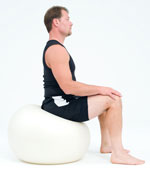
With A Ball - Hip Twist
- Sit on the ball.
- Gain your balance.
- Hold a counter or wall for support if you need. Otherwise, cross your arms across your chest.
- Move your hips in a circle to the right 8 to 10 times.
- Move yours hips in a circle to the left 8 to 10 times.
- NOTE: Do this slowly, concentrating on your balance.
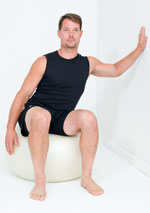
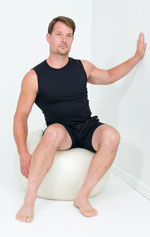
With A Ball - Sitting/Lifting One Foot
- Sit on the ball with your hands resting on the side of the ball.
- NOTE: You may need to hold the wall until you become comfortable enough to place your hands on the ball.
- From a seated position with your knees bent and your feet flat on the floor, lift your right foot a few inches off the floor. Hold it lifted for two seconds, and place it on the ground.
- NOTE: Keep your spine straight as you do this.
- Lift your left foot, hold two seconds, and place it on the ground.
- Continue alternating lifting one foot off the ground and then the other while balancing on the ball.
- NOTE: Remember to keep your stomach muscles tight.
- Repeat 8 to 10 times on each foot.
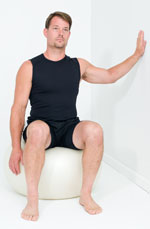
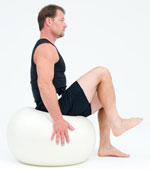
With A Ball - Sitting/Lifting One Leg
- Sit on the ball with your hands on the ball.
- NOTE: Hold the wall until you become comfortable enough to place your hands on the ball.
- From a seated position with your knees bent and your feet flat on the floor, extend your right leg out in front of you. Hold it lifted for two seconds, and then place it on the ground.
- NOTE: Keep your spine straight as you do this.
- Extend your left leg next, and hold two seconds.
- Continue alternating lifting your leg and balancing on the ball.
- NOTE: Remember to keep your stomach muscles tight.

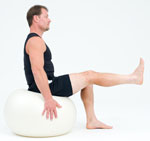
With A Ball - The Cross-Crawl
This is a little more advanced exercise, but you may find it to be just what you need. It takes you back to your babyhood, that period of life during which proprioception was establishing itself.
- Lie over the stability ball with your knees and hands on the ground.
- Once balanced and secure on the ball, reach out your right hand/arm and left foot/leg.
- Hold for 4 seconds to start.
- Return to just lying over the ball.
- Once balanced and secure, reach out your left hand/arm and right foot/leg.
- Hold for 4 seconds to start.
- Return to just lying over the ball.
- NOTE: Work to increase your time in each cross-crawl position, but don’t do more than you can do safely and securely.
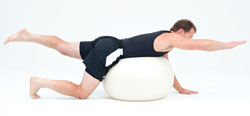
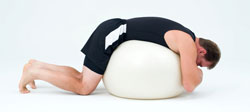
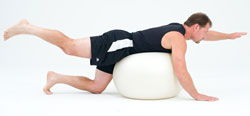

* Disclaimer
These exercises are presented for demonstration purposes only. They are not recommendations for you specifically. Consult with Pure Chiropractic about what is best for you. Do not start any exercises without doctor approval and recommendation. Only do these exercises if you are recommended to do so by your doctor. Listen carefully to any modifications your doctor gives you for each exercise. Only do the exercises to your tolerance. Do not do or continue to do any exercise that causes you pain or discomfort. If you experience any pain, stop the exercises and discuss with your doctor. If you have any questions about the appropriateness of any exercise, ask your doctor at Pure Chiropractic before proceeding.
